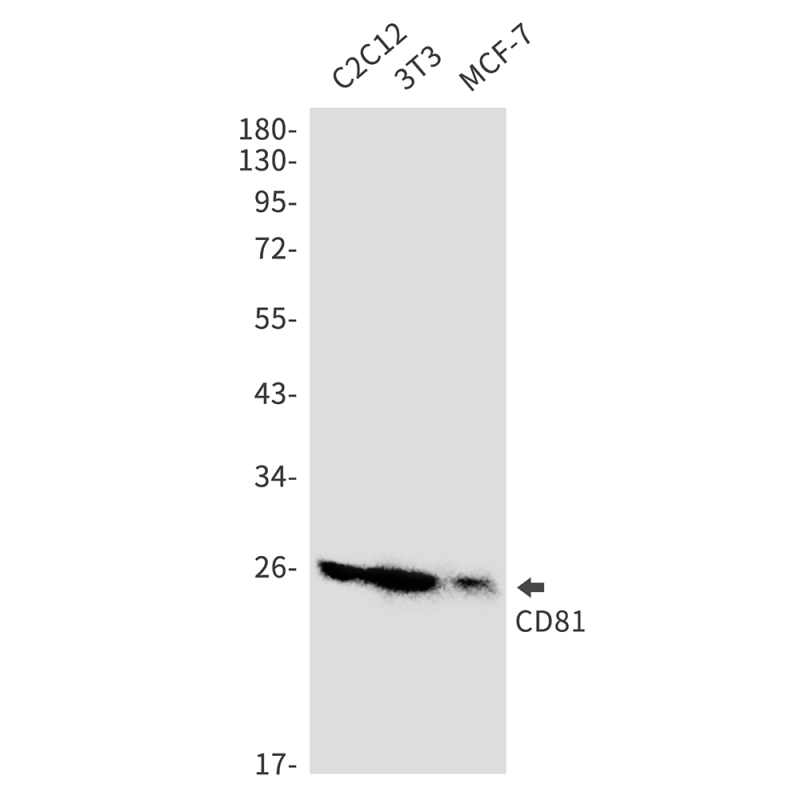
| WB | 1/500-1/1000 | Human,Mouse,Rat |
| IF | 咨询技术 | Human,Mouse,Rat |
| IHC | 1/50-1/100 | Human,Mouse,Rat |
| ICC | 1/50-1/200 | Human,Mouse,Rat |
| FCM | 咨询技术 | Human,Mouse,Rat |
| Elisa | 咨询技术 | Human,Mouse,Rat |
| Aliases | CD81; TAPA1; TSPAN28; CD81 antigen; 26 kDa cell surface protein TAPA-1; Target of the antiproliferative antibody 1; Tetraspanin-28; Tspan-28; CD81 |
| Entrez GeneID | 975 |
| WB Predicted band size | Calculated MW: 26 kDa; Observed MW: 26 kDa |
| Host/Isotype | Rabbit IgG |
| Antibody Type | Primary antibody |
| Storage | Store at 4°C short term. Aliquot and store at -20°C long term. Avoid freeze/thaw cycles. |
| Species Reactivity | Human,Mouse |
| Immunogen | Recombinant protein of human CD81 |
| Formulation | Purified antibody in TBS with 0.05% sodium azide,0.05%BSA and 50% glycerol. |
+ +
以下是3-4篇与CD81抗体相关的文献示例(信息基于公开研究概括,具体内容请以原文为准):
1. **"Structural basis of the CD81-ECD2 complex mediating hepatitis C virus entry"**
*作者:Zhang et al.*
**摘要**:研究通过冷冻电镜解析了CD81与HCV包膜糖蛋白E2的复合物结构,揭示了CD81抗体阻断病毒入侵的分子机制,为抗病毒药物设计提供依据。
2. **"CD81 regulates TLR4 activation and signaling in dendritic cells"**
*作者:Mazzocca A. et al.*
**摘要**:发现CD81抗体通过干扰TLR4信号通路抑制树突状细胞的免疫激活,表明CD81在天然免疫应答中的调控作用及其潜在治疗应用。
3. **"Targeting CD81 enhances CAR-T cell efficacy in solid tumors"**
*作者:Li C. et al.*
**摘要**:报道了一种靶向CD81的抗体联合CAR-T疗法,可破坏肿瘤微环境中免疫抑制性外泌体的摄取,显著提高实体瘤治疗效果。
4. **"CD81 tetraspanin mediates B cell receptor signaling and antigen internalization"**
*作者:Dennison S.M. et al.*
**摘要**:阐明CD81抗体通过阻断B细胞受体(BCR)共受体功能,抑制抗原内吞和下游信号传导,为B细胞相关疾病的治疗提供新思路。
**注**:以上为简化示例,实际文献需通过PubMed、Google Scholar等平台检索确认完整信息。
CD81. a member of the tetraspanin family, is a cell-surface transmembrane protein involved in organizing molecular complexes that mediate cell signaling, adhesion, and intercellular communication. It is widely expressed in immune cells, epithelial cells, and neurons. CD81 interacts with other tetraspanins (e.g., CD9. CD37) and partners like CD19. CD21. and integrins to regulate B-cell activation, T-cell responses, and antigen presentation. Its role in immune modulation has made it a focus in autoimmune diseases and cancer research.
CD81 gained prominence as a key host factor for hepatitis C virus (HCV) entry, binding the viral glycoprotein E2 and facilitating viral fusion with hepatocytes. This discovery spurred therapeutic interest in CD81-targeting antibodies to block HCV infection. In oncology, CD81 expression correlates with tumor progression in certain cancers, though its role remains context-dependent. Antibodies against CD81 are used experimentally to study its function in membrane dynamics, immune synapse formation, and extracellular vesicle release.
Commercially available CD81 antibodies (e.g., clone 5A6. JS-81) are widely used in flow cytometry, immunohistochemistry, and co-immunoprecipitation. Recent studies also explore CD81's involvement in neurological disorders and its potential as a biomarker. However, challenges persist in distinguishing between direct CD81-mediated effects and secondary impacts from disrupted protein networks. Ongoing research continues to unravel its dual roles in physiological processes and disease pathways.
×